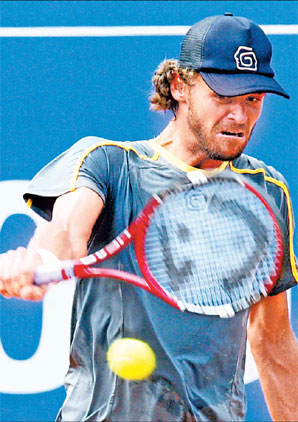Kuerten returns to Paris for swan song
PARIS: Rafael Nadal may well be on his way to becoming the greatest player ever on the clay-courts of Roland Garros, but he will likely never be held in more affection than the soon-to-be retired Gustavo Kuerten.
The already popular Brazilian forever won the hearts of an adoring Paris public for a spontaneous gesture at the end of an extraordinary fourth-round tie against American Michael Russell in 2001.
Two sets and match point down and apparently about to ingloriously lose the title he had won for the second time the previous year, Kuerten dug deep, clawed his way back into the match and, with the center crowd noisily behind him, eventually triumphed.
|
Gustavo Kuerten. AFP |
At the end he sunk to his knees and traced a huge heart with his racket on the dusty, red clay to dedicate his win to the fans in the stands.
A week later, "Guga", as he came to be known, repeated the touching gesture after the final in which he beat Alex Corretja in four sets and again the crowd went wild.
Recalling his emotions after the win over Russell, Kuerten said: "I experienced something incredible that day.
"I could feel the fans behind me and there was a synergy between us. It was a magic moment - I've never felt anything quite like that."
Kuerten had exploded onto the Paris tennis scene four years earlier when as an unknown 20-year-old, ranked 66th in the world, he became the first Brazilian male to win a Grand Slam title.
In so doing he defeated along the way three former champions - Thomas Muster, Yevgeny Kafelnikov and, in the final, Sergi Bruguera.
More than the victory itself, though, it was the flamboyant manner in which he played and his obvious warm connection with the fans that caught the eye.
Dressed in Brazilian soccer colors and with a samba-band pounding out support, Kuerten, who wore his heart on his sleeve on the court, was a refreshing change from the dour grinders of the game like previous winners Bruguera, Kafelnikov and Muster who had dominated during the 1990s.
He broke into the world top 10, but with a big wind-up on either flank usually found it tougher to compete with the best on the faster surfaces. Wimbledon in particular was a problem despite a quarterfinal appearance in 1999.
Career year
The following year, however, was probably the best of Kuerten's career.
He won his second French Open title in a tough four-setter against Magnus Norman and then went on to finish the year as world No 1, the first South American to achieve such a feat and the first non-US player in eight years.
To reach that pinnacle he did what many people thought he was incapable of - beating Pete Sampras and Andre Agassi in successive matches in an indoor carpet court in Lisbon at the season-closing Masters.
His pulsating win at Roland Garros six months later put him alongside greats such as Bjorn Borg, Ivan Lendl and Mats Wilander with three or more French Open titles in the Open era, but already the efforts were taking a toll on his body.
He won the Brazil Open on home turf at the start of 2004, and stunned the emerging Roger Federer with a straight-sets win in the third round of the French Open. But after losing to David Nalbandian in the last eight, the pain in his hips became too great and he announced he was taking indefinite time off for a medical operation.
Kuerten was never the same again.
He attempted several comebacks and even split with longtime coach Larri Passos (they were later reunited) in an effort to turn the tide, but each time the hip pain came back and he was forced to retreat to his beloved home base of Florianopolis in southern Brazil.
Having played just nine matches on tour in the last three years and with his 32nd birthday approaching and with a ranking at 1,145 in the world, the Brazilian decided early this year that he had had enough.
AFP
(China Daily 05/23/2008 page22)















